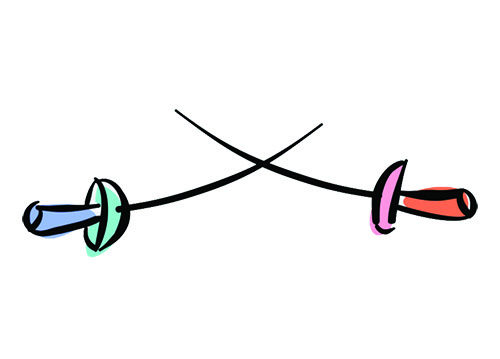
This week’s parsha begins with what seems like a bit of negativity: “Ki teitzei la’milchama—when you go to war,” “Ki yihiyeh l’ish ben sorer u’moreh—when a person has a rebellious child.” Why do we assume these things will happen? Why not say “if you go to war” and “if a person has a rebellious child”? Do we want these things to happen? Of course not. So maybe the Torah is teaching us something about expectations instead. Let’s see.
“Mom and Dad, I’ve made a decision. I’m going for it!” Amanda’s parents were not surprised, but now knew they were in for a long summer. Amanda had recently picked up the hobby of fencing and quickly mastered the foil; she was a real natural. Now, as a top-ranked amateur, Amanda had decided to train for the national championships.
Between driving Amanda to practice, helping her recover from minor injuries, making sure she was eating properly, and helping her work out, Amanda’s parents kept very busy (not to mention their actual jobs, which were starting to feel like hobbies). Throughout, they remained Amanda’s biggest fans, encouraging, applauding and making Amanda feel like nothing could stop her. However, as the summer began to wrap up and the qualifying round began to approach, Amanda overheard her mother tell her father on numerous occasions, “Remind me to tell Amanda the “Tale of When and If.” Amanda asked about this story on a few occasions, but each time was told “When the time is right, dear. When the time is right.”
When the night before the qualifying round arrived, Amanda was a nervous wreck. “What if I lose? What if this was all for nothing? I can’t let that happen! But I haven’t been doing this long enough!” Amanda was in desperate need of a good night’s sleep, but being this anxious, not only would she be up all night, she didn’t stand a chance at winning. Amanda’s mother now knew that the time had come. She walked into Amanda’s room, sat on the bed, and began the Tale of When and If:
Back when words were first created, each word wanted to be the one used most often. This competition caused many words to become rivals with one another. “Amazing” and “Incredible” were constantly bickering about who was better, as were “Terrible” and “Horrendous.” Of all the rivalries, perhaps the biggest was that involving the words “If” and “When.”
As opposed to the synonyms fighting for which was better, If and When had a different argument. For example, a person discussing a possible new job or their favorite team winning might say “when I get the job” or “when they win.” The other possibility would be to say “if I get the job” or “if they win.” Whenever this choice came up, If and When would get started. “Be positive! Be optimistic! Good things are coming your way!” When would cheer. “Don’t assume anything! Be realistic!” If would shout. Was it better to assume the best and possibly be let down or better to prepare for the worst? Nobody had the answer, so If and When had to turn to Hashem to settle the score.
Fortunately, Hashem knew If and When were coming, so it didn’t take them long to get an answer. The response was not what they expected, and confused them both. “The answer is KEY!” explained a booming voice from shamayim. “We already know the answer is key!” argued If. “But what is the answer?” asked When. “The answer is KEY!” repeated the voice over and over. Puzzled and disappointed, When and If left and headed back to their homes.
That Shabbat morning, while If and When sat near each other in shul, they each heard the baal korei begin reading the parshat hashavua. “Ki teitzei lamilchama…” Immediately, When and If turned to each other and smiled, both realizing the truth at once. The answer wasn’t “Key;” it was “Ki,” the word in the Torah that can mean both “when” and “if.” Hashem was trying to tell them that sometimes bad (and also good) things will happen, and it is important to have both perspectives. For good things you should have the optimism of “when,” but be prepared for it just to be an “if.” Similarly, for bad events, the hope is that it’s just an “if,” but bad things happen in life, so you need to be prepared for the “when.”
After hearing this story, Amanda understood. She should be hoping that failure was just an “if,” a small possibility, the same as for every other contestant. However, she needed to be prepared for “when” she fails because failure is part of life, and that’s okay. This story helped calm Amanda’s nerves and she fell asleep almost immediately. The next day, Amanda woke rested, calm and ready to take on the competition.
By Yair Daar











